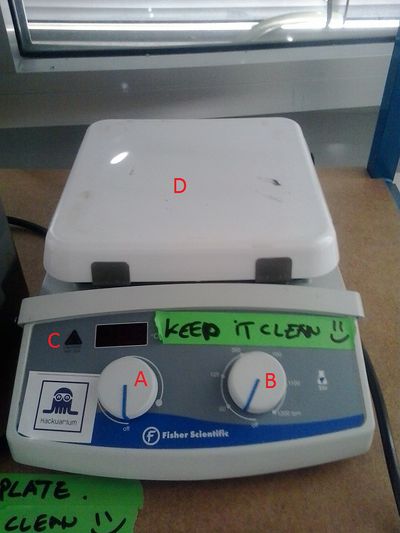Instru HeatPlate
Intro
This instrument is used to heat up solutions or materials. They usually are equipped with a magnetic stirring mechanism. They can also be equipped with a thermometer feedback device.
Heat Plate I
This simple plate has no temperature feedback mechanism and is the simplest to operate. It possesses a magnetic stirring mechanism. It is recommended to use this one if you are not looking to set a very precise temperature. (no 100°C is not a very precise temperature 67.3°C is though)
Functions
- A) Temperature setting button.
- B) Rotation setting button
- C) Temperature display and warning. You will see the temperature you set-up here.
- D) Heating zone (Warning it stay hot for a while after being done)
Rules
- 1) Do not leave any heating operation unattended.
- 2) Do not heat inflammable solvents.
- 3) If heating something make sure people around know what you are doing. Communication is key!
- 4) Please leave it clean and at its place when done.
Heat Plate II
These plates can achieve precise temperatures thanks to the temperature feedback mechanism they have. They also possesses a magnetic stirring mechanism. We have two of them operating in the same fashion: One large and a standard one.
Functions
- A) Thermometer feedback mechanism. (described below)
- B) Temperature display
- C) Temperature setting button.
- D) Heating zone (Warning it stay hot for a while after being done)
- E) Rotation setting button
- F) Holding bar for the thermometer feedback mechanism.
Rules
Same rules apply than the Plate I but add to this:
- 1) Do not use without the thermometer feedback mechanism. (make sure it is correctly plugged in the back)
- 2) Make sure the thermometer feedback mechanism is inside the liquid. SUPER DUPER IMPORTANT !!! (explained below)
